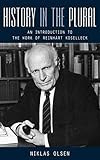History in the Plural : An Introduction to the Work of Reinhart Koselleck / Niklas Olsen.
Material type: TextPublisher: New York ; Oxford : Berghahn Books, [2012]Copyright date: ©2012Description: 1 online resource (346 p.)Content type:
TextPublisher: New York ; Oxford : Berghahn Books, [2012]Copyright date: ©2012Description: 1 online resource (346 p.)Content type: - 9780857452955
- 9780857452962
- 943.0072/02 23
- DD86.7.K65 O57 2014eb
- online - DeGruyter
| Item type | Current library | Call number | URL | Status | Notes | Barcode | |
|---|---|---|---|---|---|---|---|
 eBook
eBook
|
Biblioteca "Angelicum" Pont. Univ. S.Tommaso d'Aquino Nuvola online | online - DeGruyter (Browse shelf(Opens below)) | Online access | Not for loan (Accesso limitato) | Accesso per gli utenti autorizzati / Access for authorized users | (dgr)9780857452962 |
Frontmatter -- CONTENTS -- ACKNOWLEDGMENTS -- INTRODUCTION -- 1 FAMILY—WAR—UNIVERSITY The Various Educations of Reinhart Koselleck -- 2 Explaining, Criticizing, and Revising Modern Political Thought -- 3 SOCIAL HISTORY BETWEEN REFORM AND REVOLUTION -- 4 PROGRAM—PROJECT—STRAIGHT JACKET The Geschichtliche Grundbegriffe -- 5 THEORIZING HISTORICAL TIME AND HISTORICAL WRITING -- 6 COMMEMORATING THE DEAD Experience, Understanding, Identity -- 7 THE FOUNDATIONS AND THE FUTURE OF KOSELLECK’S SCHOLARLY PROGRAM -- BIBLIOGRAPHY -- INDEX
restricted access online access with authorization star
http://purl.org/coar/access_right/c_16ec
Reinhart Koselleck (1923–2006) was one of most imposing and influential European intellectual historians in the twentieth century. Constantly probing and transgressing the boundaries of mainstream historical writing, he created numerous highly innovative approaches, absorbing influences from other academic disciplines as represented in the work of philosophers and political thinkers like Hans Georg Gadamer and Carl Schmitt and that of internationally renowned scholars such as Hayden White, Michel Foucault, and Quentin Skinner. An advocate of “grand theory,” Koselleck was an inspiration to many scholars and helped move the discipline into new directions (such as conceptual history, theories of historical times and memory) and across disciplinary and national boundaries. He thus achieved a degree of international fame that was unusual for a German historian after 1945. This book not only presents the life and work of a “great thinker” and European intellectual, it also contributes to our understanding of complex theoretical and methodological issues in the cultural sciences and to our knowledge of the history of political, historical, and cultural thought in Germany from the 1950s to the present.
Mode of access: Internet via World Wide Web.
In English.
Description based on online resource; title from PDF title page (publisher's Web site, viewed 25. Jun 2024)


